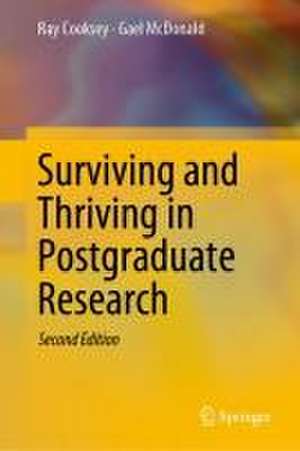Surviving and Thriving in Postgraduate Research
Autor Ray Cooksey, Gael McDonalden Limba Engleză Hardback – 9 dec 2019
The book addresses not only research-related aspects (e.g. supervisors; selecting your guiding assumptions; contextualising, framing and configuring research; reviewing literature; sampling; writing proposals; ethics and academic integrity; selecting a data gathering strategy; surviving your thesis/dissertation/portfolio examination; and publishing), but also questions concerning how to integrate, manage, and balance the research journey in the context of the postgraduate student’s broader life-world (e.g. skill development and supervisor relations; effective time and project management; a healthy work–life balance; maintaining motivation; and dealing with criticism). The book adopts an explicitly pluralist perspective on postgraduate research, moving beyond mixed methods thinking, and offers concrete examples from postgraduate students’ real-world experiences.
Preț: 745.57 lei
Preț vechi: 877.15 lei
-15% Nou
Puncte Express: 1118
Preț estimativ în valută:
142.68€ • 154.93$ • 119.85£
142.68€ • 154.93$ • 119.85£
Carte disponibilă
Livrare economică 01-15 aprilie
Preluare comenzi: 021 569.72.76
Specificații
ISBN-13: 9789811377464
ISBN-10: 9811377464
Pagini: 830
Ilustrații: XXXVII, 1170 p. 194 illus., 161 illus. in color.
Dimensiuni: 155 x 235 mm
Greutate: 1.77 kg
Ediția:2nd ed. 2019
Editura: Springer Nature Singapore
Colecția Springer
Locul publicării:Singapore, Singapore
ISBN-10: 9811377464
Pagini: 830
Ilustrații: XXXVII, 1170 p. 194 illus., 161 illus. in color.
Dimensiuni: 155 x 235 mm
Greutate: 1.77 kg
Ediția:2nd ed. 2019
Editura: Springer Nature Singapore
Colecția Springer
Locul publicării:Singapore, Singapore
Cuprins
Chapter 1 - Why am I doing this and what do I expect?.- Chapter 2 - What skills do I need.- Chapter 3 - Should I keep a research diary?.- Chapter 4 - How should I manage the relationship with my supervisor?.- Chapter 5 - How should I manage the research project?.- Chapter 6 - How should I manage my time?.- Chapter 7 - How do I stay on track?.- Chapter 8 - How do I maintain a good work/life balance?.- Chapter 9 - How do I decide on my guiding assumptions?.- Chapter 10 - How should I position my study?.- Chapter 11 - How do I identify/frame my research problem and questions?.- Chapter 12 - How do I scope and shape my research project?.- Chapter 13 - How should I select, read and review the literature?.- Chapter 14 - What data gathering strategies should I use?.- Chapter 15 - How do I handle academic integrity issues?.- Chapter 16 - How should I shape and defend my proposal?.- Chapter 17 - How can I gain access to data sources?.- Chapter 18 - When and how should I deal with measurements?.- Chapter 19 - How do I manage the sampling process?.- Chapter 20 - How should I organise my data?.- Chapter 21 - How should I approach data analysis and display results?.- Chapter 22 - How should I tell a convincing story?.- Chapter 23 - How should I respond to criticisms that arise.- Chapter 24 - How will my thesis/ dissertation be examined and judged?.- Chapter 25 - Should I publish as I go?.- Chapter 26 - Common pitfalls.
Notă biografică
Ray Cooksey is an Emeritus Professor at the UNE Business School, University of New England, Armidale, Australia. His research mainly focuses on the areas of decision making and cognition, chaos and complexity theory, organisational and behavioural systems theory, leadership, teacher judgment, pluralist approaches to research, climate change and adaptation, and multivariate statistics.
Gael McDonald is a Professor and President of RMIT Vietnam. Her main research interests are in international marketing, human resource management, and organisational behaviour.
Gael McDonald is a Professor and President of RMIT Vietnam. Her main research interests are in international marketing, human resource management, and organisational behaviour.
Textul de pe ultima copertă
This handbook provides an in-depth exploration of the entire journey of postgraduate research in the social and behavioural sciences, from enrolment to its culmination in the form of a thesis, dissertation or portfolio, and beyond. It is written in an accessible and example-rich style, offering practical and concrete advice in virtually all areas. It also includes references to additional resources and websites, and each chapter features key recommendations for improving the postgraduate research experience.
The book addresses not only research-related aspects (e.g. supervisors; selecting your guiding assumptions; contextualising, framing and configuring research; reviewing literature; sampling; writing proposals; ethics and academic integrity; selecting a data gathering strategy; surviving your thesis/dissertation/portfolio examination; and publishing), but also questions concerning how to integrate, manage, and balance the research journey in the context of the postgraduate student’s broader life-world (e.g. skill development and supervisor relations; effective time and project management; a healthy work–life balance; maintaining motivation; and dealing with criticism). The book adopts an explicitly pluralist perspective on postgraduate research, moving beyond mixed methods thinking, and offers concrete examples from postgraduate students’ real-world experiences.
The book addresses not only research-related aspects (e.g. supervisors; selecting your guiding assumptions; contextualising, framing and configuring research; reviewing literature; sampling; writing proposals; ethics and academic integrity; selecting a data gathering strategy; surviving your thesis/dissertation/portfolio examination; and publishing), but also questions concerning how to integrate, manage, and balance the research journey in the context of the postgraduate student’s broader life-world (e.g. skill development and supervisor relations; effective time and project management; a healthy work–life balance; maintaining motivation; and dealing with criticism). The book adopts an explicitly pluralist perspective on postgraduate research, moving beyond mixed methods thinking, and offers concrete examples from postgraduate students’ real-world experiences.
Caracteristici
Covers the entire postgraduate research journey, from initial considerations for enrolment, to the final thesis/dissertation, and potentially publication Examines a range of research paradigms and data gathering strategies with a coherent focus on how to meet the expectations and criteria for research quality Offers concrete examples from postgraduate students’ real-world experiences
